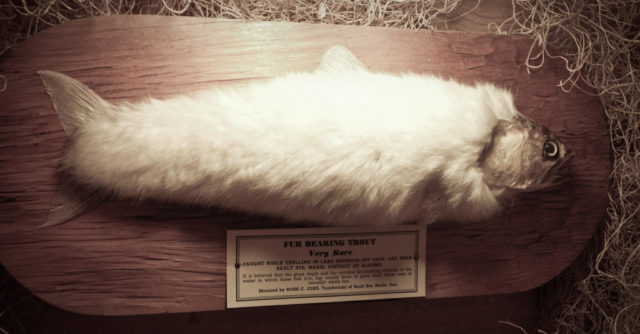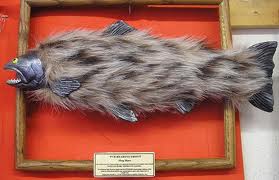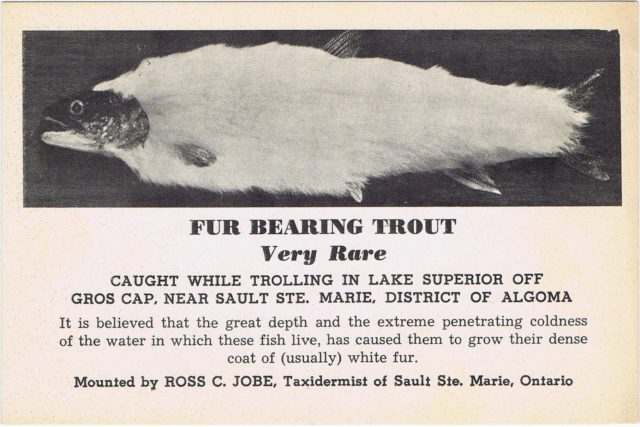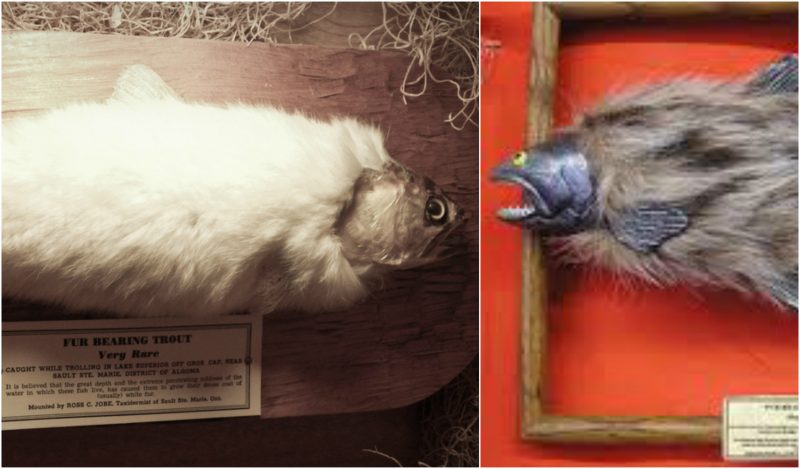We’ve heard all kinds of stories and testimonies about encounters with strange water creatures. Most of them are scary and huge ancient sea monsters, but this one is a little bit different.
It’s not scary at all; in fact, it’s actually quite cute. The name of this “beast” is the Fur-Bearing Trout or the Furry Trout. Today it is widely accepted as a hoax. People probably invented the fish based on old legends and stories.
The first accounts about furry fish come from North America in the 17th century. According to the stories, the trout grew a coat of fur to maintain their body heat in the cold Northern waters. They were first mentioned in a letter from a Scottish immigrant to his relatives.
In the letter, he says that there is an abundance of “furred animals and fish” in the New World. His relatives probably misunderstood the words and asked him to send them an example of these “furred fish.” He realized that they got confused and decided to send them one that he skillfully made. The story about fishes with fur soon spread across the world.
In 1900, a story appeared in Iceland mentioning the Icelandic Lodsilungur, the local version of the furry trout. According to the publication where the story appeared, this fish has long been part of Icelandic folklore.

According to most of the stories, the fictional Furry Trout are usually found in the cold lakes and rivers of Arkansas, Canada, and Iceland.
Over the years, many legends and unbelievable stories have appeared about fur-bearing-trouts. Some of them are more credible and were probably invented together with the false taxidermy specimens, and some are pure fiction, hilarious and unbelievable. Here are some of the funniest:
The Icelandic tale is one of the strangest. The Lodsilungur (furred fish) are inedible and swarm rivers. In Icelandic legends, they are punishment for the evilness of humans. It was also said that if a man eats a furry trout, he will get pregnant and deliver the child through his opened scrotum.
Most of the stories about the furry trout originated from the USA.

In a 1929 issue of Montana Wildlife magazine, J.H. Hicken says that when a furry trout is caught, “the change of temperature from this water to the atmosphere is so great that the fish explodes upon being taken from the water, and fur and skin come off in one perfect piece, making it available for commercial purposes.”
Another story was invented by Wilbur Foshay, an American businessman who even managed to attract the media. In his version, the trouts grew fur in the winters, and as the water temperature increased in summer, they lost the fur.
S.E. Schlosser made a funny version of the story. Schlosser said that its fur is the result of two bottles or four jugs of spilled hair tonic. Here is the advice of how to catch a furry trout: a fisherman should dress as a barber and offer the fish a free trim or shave.
Here is another wacky story from Maine. Allegedly, the furry trout was under catch and release policy and guarded by wardens. If somebody managed to catch one, they would measure it against the foot of the catcher. If it matched the fisherman’s foot, he could keep it and make furry shoes out of the skin.

In Canada, a fur-bearing trout was supposedly caught in Lake Superior and prepared by a taxidermist called Ross C. Jobe. The man who purchased it was so sure that this was a genuine specimen and he decided to give it to the Royal Museum of Scotland. He later learned that it was a hoax. It was just a regular fish wrapped in rabbit fur.
Besides this legend, there are no actual examples of the fur-bearing trout species in existence. There are only some false taxidermy specimens. However, a strange mold sometimes infects real fishes that may give the impression of a furry trout. The infection is called “cotton mold” (Saprolegnia) and it causes the appearance of fur-like growth over the body of the fish. After a prolonged infection, the fish dies, and the mold continues to grow on its body. The dead fish covered with “fur” sometimes wash up on the shores and can be mistaken for a genuine furry fish. This is probably the real origin of all these fisherman’s tales.
